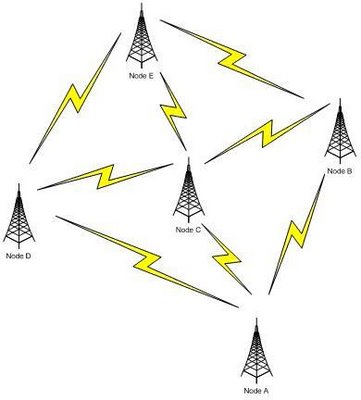About our future research
Well, I decided to write this post in English once again .. of course not all postings are entirely English :D
Few days ago we had a meeting on our future works in R-NGN (I think I've mentioned this acronym before so I don't mention it again), WiNNER Team together with INSRG (Information Network System Research Group) led by Dr.Ing. Suhardi while WiNNER as I've also mentioned earlier well ... refer it to my previous posts will ya :P
The aim is obvious .. to provide ICT (Information and Communication Technology) infrastructure for rural areas uncovered with current technology. VSAT however, has already run before. Unfortunately, although it is a very powerful access technology the cost could raise to a significant value normal people couldn't afford. Of course, we wouldn't burden them by high cost right ? Heck .. most of them couldn't even fulfill daily needs and now we strangle them again with that ?? no way!
Another way to diminish digital divide particularly, we use terrestrial wireless instead. This method also has its own deals --every methods have but we're now thinking on the optimum ways--
Since our rural areas are mostly grouped in discrete pattern, it is possible if we implement mesh network topology to connect them one to another. By this kind of topology, all nodes are connected so with routing protocols data could flow from which we desire. But alas, mesh topology deals with these 2 main problems:
Unreliability
Data flows from node(s) to node(s) has its own routing scheme. Similiar to roadway networks, although all roads are connected there's a possibility that some intersections have extra loads on serving vehicle flows. Thus, traffic jams occur and by traffic flows with certain probability as proposed by A.K. Erlang will most likely to be blocked. In other words because a serving node could handle finite numbers of clients ie. data, an overload flow will cause it to shut down. Without good knowledge on QoS grants, we could say that without proper routings instead of making network more reliable we emerge a new way to crash the whole thing ! This factor is a must to consider in mesh network.
Unpredictability
There's no guarantee all nodes are fully operational, if a node is down routing schemes must be adjusted so there are no overflows as a consequence. Combinations of nodes would complicate situations, so it isn't quite wise to route data on a specific routes constantly. An adorable method is by utilizing an adaptive routing, ie. all nodes have intelligence to sense what nodes that are on its critical status and what nodes that are less duty, thereafter data can be sent to nodes without facing an ultimate network disaster. Now this adaptive routing means we create an algorithm that could do those tasks.
In mesh network, we cannot omit those factors .. there are more factors affecting overall performance but those two are the killer factors in all kind of mesh topology.



